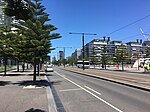Festival Hall (Melbourne)
1915 establishments in AustraliaBoxing venues in AustraliaDrinking establishments in AustraliaMusic venues in MelbourneOlympic basketball venues ... and 5 more
Olympic boxing venuesOlympic gymnastics venuesUse Australian English from June 2011Venues of the 1956 Summer OlympicsWrestling venues
Festival Hall is a heritage listed entertainment venue located at 300 Dudley Street, West Melbourne, Victoria. It is one of Melbourne's larger concert venues and has hosted a variety of local and international acts over many years. In October 2020, Hillsong purchased the Festival Hall venue. It will continue to host entertainment events, in addition to hosting Hillsong Church Melbourne City's weekly church services. The building is set to undergo renovation to better suit the new uses.
Excerpt from the Wikipedia article Festival Hall (Melbourne) (License: CC BY-SA 3.0, Authors).Festival Hall (Melbourne)
Dudley Street, Melbourne Docklands
Geographical coordinates (GPS) Address External links Nearby Places Show on map
Geographical coordinates (GPS)
| Latitude | Longitude |
|---|---|
| N -37.811111111111 ° | E 144.94638888889 ° |
Address
Festival Hall
Dudley Street 300
3008 Melbourne, Docklands
Victoria, Australia
Open on Google Maps









